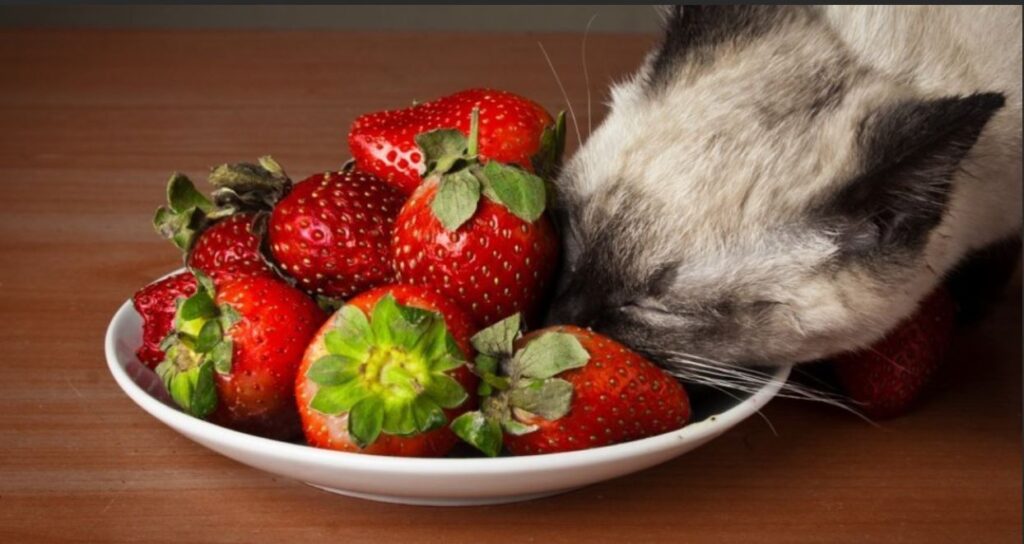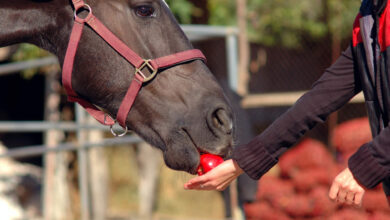
Horses can be picky eaters, but most enjoy a sweet treat every now and then. Strawberries in particular are a favorite among many equines.
Their sweet taste and juicy texture make them an appealing snack. But can horses eat strawberries safely?
Can Horses Eat Strawberries?
The short answer is yes! Strawberries are non-toxic for horses and can be fed to them in moderation as part of a balanced diet.
Many horses relish the taste of ripe, red strawberries. Here are some key benefits horses can gain from eating strawberries:

- Excellent source of vitamin C, which supports immune health and collagen formation
- Provides antioxidants like anthocyanins that can reduce inflammation
- Fiber aids digestion and gut health
- Hydrating and may encourage picky horses to drink
- Natural sugars for energy
Strawberry Nutrition Facts
While small, strawberries pack a nutritional punch. One cup of sliced strawberries contains:
- 82 calories
- 3 grams fiber
- 98 mg vitamin C (over 100% DV)
- 26 mcg folate (7% DV)
- 232 mg potassium (7% DV)
They’re also high in antioxidants like anthocyanins, ellagic acid, quercetin and catechins.
Other Fruits and Vegetables Horses Can Eat
In addition to strawberries, horses can safely enjoy apples, pears, carrots, bananas and watermelon in moderation. Always introduce new foods gradually.
Read More: Can Horses Eat Bananas?
A Sweet and Nutritious Treat
Strawberries make for a nutritious treat that most horses will gladly gobble up. Be sure to wash them thoroughly, remove stems, and chop or mash for easier eating.
For an extra special treat, whip up some Strawberry Oatmeal Cookies using 3 overripe strawberries, 1 cup oats, 1 tbsp molasses and 2 tbsp oil. Bake at 350F for 20 minutes for a sweet homemade snack horses will love.
Offer no more than a few cookies or 1⁄2 cup strawberries at a time.
While strawberries can make a tasty treat, there are some safety considerations horse owners should keep in mind. Moderation is key when feeding any new food item.
Potential Concerns with Feeding Strawberries
- High sugar content – Too many strawberries could spike blood sugar.
- Pesticides – Always wash thoroughly and buy organic when possible.
- Choking hazard – Slice strawberries to reduce risk.
- Moldy berries – Inspect thoroughly and discard any spoiled fruit.
Are Strawberries Safe for All Horses?
Strawberries are safe for most healthy adult horses. However, some considerations include:
- Senior horses may have difficulty chewing. Mash or puree strawberries.
- Diabetic horses should avoid high sugar fruits like strawberries.
- Overweight horses should only receive strawberries occasionally.
- Horses with allergies or sensitivities may react. Introduce slowly.
How to Prepare and Serve Strawberries
To safely feed strawberries:
- Wash thoroughly to remove dirt and pesticides
- Remove green stems and leaves
- Slice lengthwise to make chewing easier
- Mash fully ripe berries to a puree for senior horses
Recommended Serving Size and Frequency
- Start with no more than 1⁄4 cup sliced strawberries at a time
- Increase gradually to no more than 1⁄2 to 1 cup per day
- Feed a few times a week, not daily
- Provide as part of a balanced diet
Signs of an Allergic Reaction
Monitor your horse when first feeding strawberries. Allergic signs may include:
- Hives or swelling around mouth/face
- Diarrhea or colic symptoms
- Itchy skin or abnormal behaviors
A Historic Equine Treat
Strawberries have been enjoyed by humans and horses alike for centuries.
In fact, medieval texts indicate knights fed strawberries to their mighty steeds as a ceremonial honor after tournaments and battles.
The bright red berry was seen as a prize offered only to the most valiant horses.
So next time you treat your horse to juicy, ripe strawberries, you are continuing an ancient tradition of honoring our equine partners!
Moderation and proper preparation are key when treating horses to sweet, nutritious strawberries. Follow basic safety guidelines and both you and your horse can enjoy these flavorful fruits.
Other Factors to Chip In
When feeding strawberries to horses, most people offer the juicy red fruit. But what about the leaves and stems? Should these berry parts be shared as well? Let’s take a closer look.
Can Horses Eat Strawberry Leaves and Stems? The general consensus is no.
The leaves and stems of strawberries plants contain oxalates. Oxalates can bind to calcium in the body and cause kidney problems if consumed in excess.
- The leaves are especially high in oxalates and should be avoided.
- The stems contain lower levels but are still fibrous and offer little nutritional value.
- Only feed the red fruit portion to be safe. Discard the leaves, stem, seeds and hull.
Expert Opinions on Feeding Strawberries
Equine nutritionists and veterinarians generally approve of strawberries as an occasional treat. For example:
“Strawberries make a fine snack for most horses. Just be sure to introduce them slowly and avoid overfeeding as you would with any sugary treat.” – Dr. Sarah Goldstein, Equine Nutritionist
However, some vets advocate for a whole food, species-appropriate diet:
“While not toxic, strawberries are not a natural part of a horse’s diet. For optimum health, I recommend focusing on hay, grasses, and herbs they would naturally graze.” – Dr. Alicia Mack, Holistic Veterinarian
Strawberry Recipes for Horses
Here are some creative ways to serve strawberries as a tasty treat:
- Strawberry Banana Horse Cookies – Mash 1 ripe banana and 1 cup strawberries. Mix with 2 cups oats and 1/4 cup flour. Scoop spoonful onto a baking sheet and bake at 350F 15-20 minutes.
- Strawberry Horse Popsicles – Blend together 2 cups chopped strawberries with 1 banana and juice from 1 orange. Pour into popsicle molds and freeze overnight.
Satisfy Your Horse’s Sweet Tooth
In moderation, strawberries make a nutritious and delicious snack that horses eagerly enjoy. Respect basic precautions, feed only the red fruit portion, and add variety to your horse’s diet.
An occasional strawberry treat can be a special bonding experience for both you and your equine companion.



